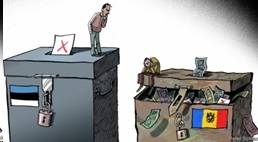Estonia and Moldova have similar origins, but could not be more different. Both declared independence from the Soviet Union in August 1991. Both tiny countries have big Russian minorities, and both have struggled with emigration and shrinking populations. Yet where Estonia has joined the EU, become an IT hub and is virtually corruption-free, Moldova struggles with corruption and its citizens are five times poorer than Estonia’s. Was Estonia’s fortune down to luck or good choices?
Moldova and Estonia show how different democracies can be
One post-Soviet country defeated corruption, the other is still battling it
 Chisinay and Tallinn, Feb.28.– Kaja Kallas, a former competition lawyer and member of the European Parliament, is just the sort of businesslike politician one expects in Estonia. She took over as leader of Estonia’s liberal Reform Party last year; polls show it in a dead heat with the ruling Centre Party. She has run a technocratic campaign, focusing on education and tax policy. But she loses her cool when she talks about EKRE, Estonia’s anti-immigrant, Eurosceptic populist party. “They want to destroy everything,” she says: all the institutions that have made her open, tech-savvy nation more successful than “other countries that had the same starting-point. Take Moldova, for example.”
Chisinay and Tallinn, Feb.28.– Kaja Kallas, a former competition lawyer and member of the European Parliament, is just the sort of businesslike politician one expects in Estonia. She took over as leader of Estonia’s liberal Reform Party last year; polls show it in a dead heat with the ruling Centre Party. She has run a technocratic campaign, focusing on education and tax policy. But she loses her cool when she talks about EKRE, Estonia’s anti-immigrant, Eurosceptic populist party. “They want to destroy everything,” she says: all the institutions that have made her open, tech-savvy nation more successful than “other countries that had the same starting-point. Take Moldova, for example.”
Indeed, take Moldova. Like Estonia, it declared independence from the Soviet Union in August 1991. Both tiny countries have big Russian minorities, and both have struggled with emigration and shrinking populations. Yet in many ways they are polar opposites.
Estonia joined the European Union in 2004 and the euro zone in 2011; Moldova’s EU candidacy has ground to a halt. Transparency International deems Estonia squeaky-clean, the 18th-least-corrupt country in the world. Moldova is 117th. Estonia is an IT hub, Moldova a farm economy whose pride is its excellent wines. Adjusted for purchasing power, Estonians are five times richer than Moldovans.
This week both countries held elections. Estonia’s polls close on March 3rd, but internet voting started ten days earlier. Moldova’s vote took place on February 24th. The results gave some hope for progress in Moldova. An alliance of reformist parties called ACUM, headed by two corruption-fighters, Maia Sandu and Andrei Nastase, took 27 of parliament’s 101 seats. But the Socialist Party (PSRM), aligned with the Russia-friendly president, Igor Dodon, got 34 ...
[ Full text ]
Comments powered by CComment